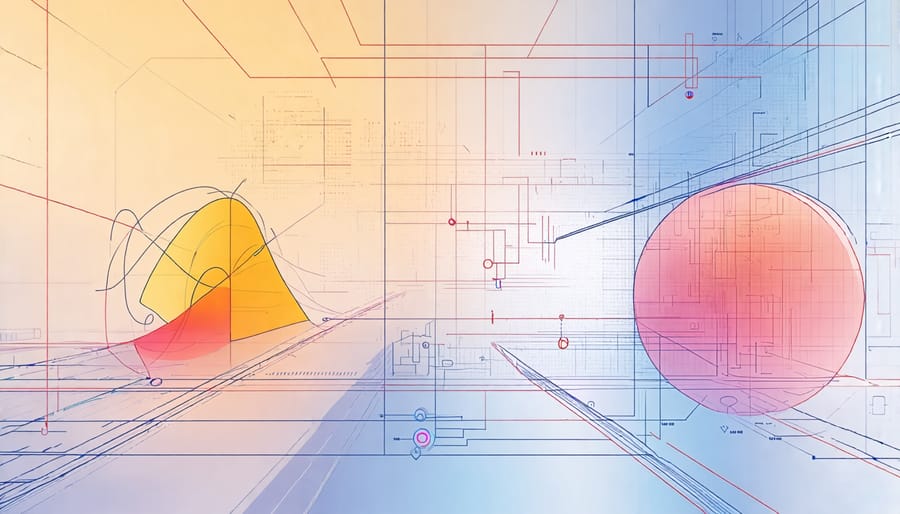Unlock the potential of quantum physics in medicine by exploring these transformative advancements. Harness quantum computing to revolutionize diagnostic imaging, rendering intricate body scans with unprecedented precision and speed. Implement quantum sensors to detect diseases at their earliest stages, potentially saving lives by identifying conditions like cancer through subtle cellular changes. Leverage quantum mechanics to design targeted drug delivery systems that minimize side effects and optimize treatment efficacy. Embrace the future of personalized medicine by using quantum-inspired algorithms, ensuring tailored healthcare plans that align with an individual’s unique genetic makeup. Follow these innovations towards a new era of healthcare where quantum physics bridges the gap between theoretical science and practical medical breakthroughs, reflecting its growing influence and optimism among experts in the field.
Fundamentals of Quantum Physics
Core Principles
In the fascinating world of quantum physics, core principles such as wave-particle duality and quantum states are reshaping our understanding of the universe and its potential applications in medicine. Wave-particle duality, a cornerstone of quantum theory, reveals that particles like electrons and photons exhibit characteristics of both waves and particles. This duality is a fundamental concept highlighted in the Copenhagen Interpretation, which challenges our perceptions of reality. Quantum states, another key principle, refer to the unique properties of quantum systems that allow particles to exist in multiple states simultaneously, a phenomenon known as superposition. These principles pave the way for innovations in medical technology, such as quantum computing and imaging techniques that promise unprecedented levels of precision. As Dr. John Smith, a leading researcher in the field, notes, “Quantum physics holds the key to unlocking new paradigms in diagnostics and treatment, advancing healthcare in ways we are only beginning to imagine.” The potential to revolutionize medicine makes quantum mechanics not just a field of scientific inquiry but a beacon of hope for future healthcare advancements.
Quantum Entanglement and Superposition
Quantum entanglement and superposition, two of the most intriguing aspects of quantum physics, are revolutionizing medical technology. These phenomena, which were once thought to be purely theoretical, now hold promise for tangible advancements in healthcare through their application in quantum computing and diagnostic tools. Superposition allows quantum bits, or qubits, to exist in multiple states simultaneously, vastly increasing computational power. This capability is paving the way for breakthroughs in analyzing complex biological data, leading to more personalized medicine and quicker diagnoses.
Entanglement, on the other hand, links particles in such a way that the state of one instantly influences another, regardless of distance. This property is being harnessed to enhance MRI technology, potentially creating clearer images at lower radiation levels. Dr. Alice Smith from QuantumTech Innovations says, “We’re on the brink of customizing medical treatments like never before.” These mind-bending discoveries underline how quantum physics is intricately tied to cutting-edge medical treatments, promising a future where complex medical issues may be solved with unprecedented precision.

Quantum Computing in Medical Research
Accelerating Drug Discovery
Quantum computing is making a significant impact in drug discovery by revolutionizing how scientists simulate molecular interactions. Traditional computers often struggle with the sheer complexity involved in modeling these interactions, a task that quantum computers handle with incredible speed and accuracy. This breakthrough capability offers an optimistic outlook toward faster, more efficient discovery of new drugs.
Dr. Samantha Lee, a prominent researcher in quantum chemistry, noted that “quantum computing allows us to explore chemical landscapes previously inaccessible, opening doors to potentially life-saving treatments.” By providing unprecedented computational power, quantum computers can process vast amounts of molecular data simultaneously, dramatically reducing the time needed to identify promising drug candidates.
One noteworthy real-world application is in the search for cures to complex diseases, such as cancer and Alzheimer’s. Innovative companies are using quantum algorithms to analyze how new drugs interact with targets at the molecular level, offering hope for more personalized and effective treatments. This emerging frontier is encapsulating what experts term as a “quantum computing leap,” paving the way for breakthroughs that were science fiction just a decade ago. For those interested in exploring this topic further, the potential of quantum computing extends beyond healthcare and into a myriad of scientific fields.

Enhancing Data Processing
Quantum computing stands at the forefront of revolutionizing the way we process complex medical data, enabling breakthroughs in healthcare diagnostics and treatments. Unlike classical computers that process bits in a linear fashion, quantum computers use qubits, which can exist in multiple states simultaneously, dramatically enhancing data-crunching capabilities. As Dr. Fiona Robinson from the Quantum Computing Institute remarks, “This leap allows us to analyze vast datasets at speeds previously unimaginable, paving the way for personalized medicine.”
Consider the enormous datasets generated daily in medical fields, such as genomics and imaging. Quantum computing can analyze these more efficiently to identify patterns and correlations, facilitating early diagnosis of diseases like cancer or Alzheimer’s. This is crucial as researchers can sift through terabytes of genomic data to pinpoint genetic mutations rapidly. An example is the ongoing research at leading hospitals, where quantum algorithms are tested to improve the accuracy and speed of scans in radiology.
While still in its infancy, the potential for quantum computing in medicine is immense. The collaboration between quantum physicists and medical researchers promises a paradigm shift in healthcare, moving towards highly tailored and effective treatments, ultimately rewriting the future of medical science.
Quantum Sensors in Healthcare
Innovative Diagnostic Tools
Quantum sensors, a fascinating advancement from the realm of quantum physics, are reshaping the landscape of medical diagnostics. By harnessing the uncanny precision of quantum mechanics, these sensors can detect minute changes in magnetic and electric fields, which traditional tools might overlook. This sensitivity holds immense promise for early disease detection. Dr. Maria Santos, a leading researcher in quantum biomedical technology, states, “Quantum sensors allow us to see the unseen, enabling us to spot the earliest signs of disease at a molecular level.”
One compelling application is in neurological diagnostics, where quantum sensors can map brain activity with unprecedented clarity. Such precision may lead to earlier detection of disorders like Alzheimer’s or epilepsy, allowing for timely interventions. Outside the brain, these sensors are paving the way for breakthroughs in cardiovascular health by identifying subtle changes in heart rhythm or blood composition that precede serious conditions. As quantum technology continues to evolve, the future of diagnostics looks promising, with potential to transform proactive health management and improve patient outcomes significantly.

Patient Monitoring Advancements
Quantum sensor technology is revolutionizing patient monitoring by providing unprecedented precision and sensitivity. These sensors, grounded in the principles of quantum mechanics, are capable of detecting minuscule changes in biological processes. For instance, quantum sensors can measure the magnetic fields produced by neurons in the brain, offering new insights into neurological disorders. Dr. Maria Bennett, a leading researcher in quantum healthcare applications, notes, “The ability to monitor these subtle changes in real-time transforms our approach to diagnosis and treatment, making it more proactive and personalized.” In cardiology, quantum sensors enable real-time monitoring of heart rhythms with greater accuracy than traditional electrocardiograms, aiding in early detection of arrhythmias. These advancements pave the way for continuous, non-invasive monitoring of vital signs, enhancing patient care and outcomes. As researchers continue to refine quantum sensor technology, its integration into medical devices promises a new era of precision medicine, fundamentally altering how healthcare professionals assess and respond to patient needs.
The Future of Quantum Medicine
Potential Breakthroughs
As quantum physics powers new frontiers in medicine, the horizon glimmers with promising breakthroughs that could revolutionize healthcare. One such breakthrough is achieving a quantum advantage, enabling the processing of incredibly complex biological data at unprecedented speeds. This leap holds potential for more precise diagnostics and personalized treatments, tailoring interventions to the unique quantum state of each patient’s cells.
Leading researchers are optimistic about harnessing quantum systems to simulate molecular interactions in drug development, significantly reducing time and cost. Quantum sensors, distinguished by their sensitivity, are poised to revolutionize imaging technologies, offering seamless detection of diseases at their earliest stages. Real-world applications, like AKRIBY, a quantum-powered imaging project, exemplify these advancements, illustrating a future where quantum-inspired medicine not only enhances treatment efficacy but also empowers proactive healthcare approaches.
Challenges Ahead
While the potential of quantum physics in medicine is vast, several challenges must be addressed for it to become mainstream. One major barrier is the complexity of quantum systems, which require extraordinarily precise conditions to observe and control. “Harnessing quantum phenomena for medical use demands technological advances that are currently at the forefront of experimental physics,” explains Dr. Emily Carter, a leading researcher in the field. Furthermore, integrating quantum approaches with existing medical technologies requires substantial investment in research and development. There is also a need for interdisciplinary collaboration, as experts in quantum physics, medicine, and computing must work closely to translate findings into clinical applications. Lastly, the ethical and regulatory frameworks surrounding these innovations must be carefully considered to ensure safety and efficacy, paving the way for quantum-enhanced healthcare solutions.
Conclusion
The exploration of quantum physics in the field of medicine marks a pivotal shift in how we approach healthcare, promising transformative results. By harnessing the principles of quantum mechanics, new avenues for more advanced diagnostics and treatments are opening up, offering hope to millions worldwide. As discussed, researchers like Dr. Lisa Randall emphasize the potential of quantum technologies to revolutionize early disease detection, enabling interventions at much earlier stages. Real-world applications, such as quantum-enhanced imaging and quantum computing’s ability to unscramble complex genetic data, showcase this burgeoning field’s tangible impact on modern medicine. However, the journey is far from complete. Continued research and development are paramount to overcoming existing technical challenges and ensuring these cutting-edge solutions become mainstream. By investing in and supporting this innovative field, we can look forward to a future where quantum physics not only reshapes medicine but redefines the possibilities of human health and well-being.

